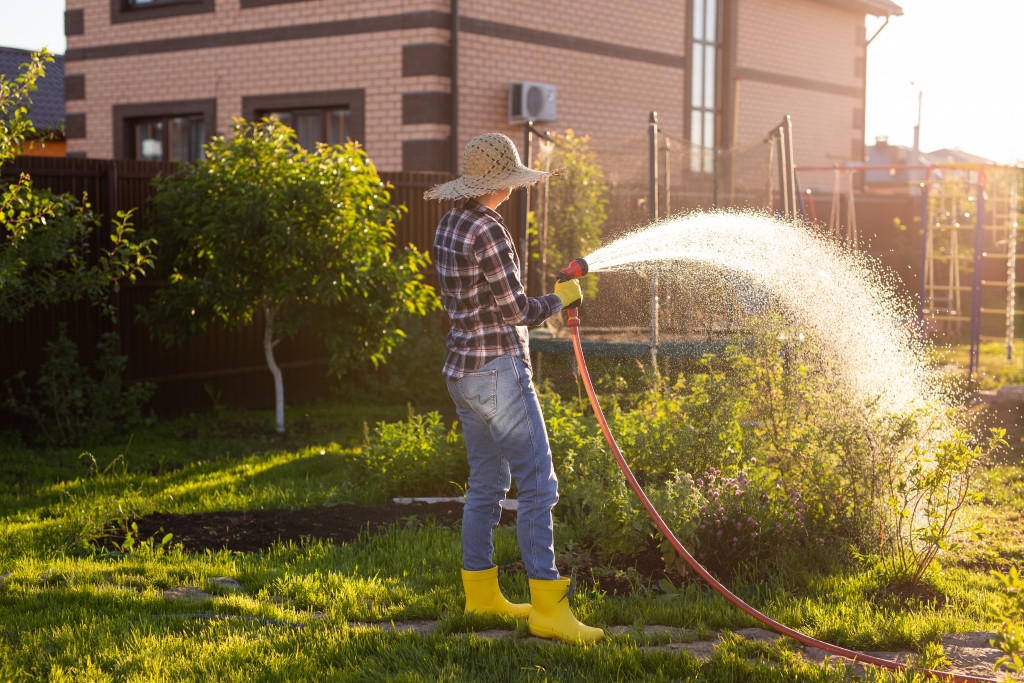There are many benefits to having a garden for homeowners. For one, gardens provide fresh fruits and vegetables that you can eat right from the garden. This is a great way to get your daily vitamins and minerals, and it’s also a lot cheaper than buying produce from the store. In addition, gardening is a great way to get exercise. Gardening can involve bending, stretching, and squatting, so it’s a great way to get some aerobic exercise without going to the gym.
Gardens can also help improve your mental health. Studies have shown that people who garden are less likely to suffer from depression and anxiety. Gardens can also be calming and soothing, which can be helpful for people with conditions such as PTSD or ADD/ADHD.
Finally, gardens are great for the environment. They help reduce greenhouse gas emissions by absorbing carbon dioxide from the atmosphere. Gardens also help conserve water by reducing runoff, and they can help attract pollinators such as bees and butterflies.
However, maintaining a garden comes with plenty of challenges, with winter among the most difficult. Here are some tips to help you keep your garden safe during the winter months.
Plant Cold-Tolerant Plants
Planting cold-tolerant plants is a great way to prepare for winter. By anticipating the climate, you can plant plants that survive colder temperatures. Some plants that are known for being cold-tolerant include roses, holly, ivy, and boxwood.
It’s also important to consider the location of your garden. The north side of your house will be colder than the south side, so you’ll want to plant cold-tolerant plants on the north side of your garden. You’ll also want to ensure that your garden is sheltered from the wind, as the wind can damage plants in cold weather.
Ask your local garden center for advice if you’re unsure which plants are cold-tolerant. They’ll be able to recommend plants that will thrive in your area’s climate.
Cover Fragile Plants
Of course, you have complete control of your garden, so you can plant whatever you like. If you decide to grow fragile plants that are not cold-tolerant, then it’s essential to take extra steps to protect them during the winter months.
One way to do this is by covering your plants with burlap or fabric. This will help insulate the plant and prevent it from freezing in extreme temperatures. You can also mulch around the base of your plants to keep their roots warm and protected.
Apply a Layer of Mulch
Mulches are great for keeping your soil healthy during winter because they are a barrier between the ground and cold air temperatures. When applied correctly, mulches also help retain moisture, which is essential for protecting delicate roots during prolonged cold spells.
Mulches come in various materials, including wood chips, straw, and grass clippings. When choosing your type of mulch, ensure it is organic so that you don’t introduce any chemicals into your garden bed.
Winter Greenhouse

If you have enough wiggle room in your budget, you can also invest in a winter greenhouse. Greenhouses help keep your plants warm and protected throughout winter with minimal maintenance. They also provide a place to start seedlings if you want an early jump on gardening to come springtime.
You can invest in a company that provides winter greenhouse installation. The professionals can construct a well-established structure to protect your garden. You can also build your own if you’re ready for a DIY project. Whichever option you choose, it’s essential to ensure that the greenhouse is well-insulated and heated so that your plants stay safe throughout winter.
Trim Dead Branches
Throughout winter, trim any dead branches on trees or shrubs in your garden. This will help ensure the plant remains healthy and protect it from further damage during extreme temperatures.
In addition, removing dead branches will also help reduce the risk of disease spreading among your other plants, as fungi and bacteria tend to spread quickly during colder months.
Water Your Plants Regularly
Although some plants may appear dormant throughout winter, they still require water to survive. Water your plants regularly, especially during prolonged cold spells, is essential to help them withstand the colder temperatures.
Be mindful of how much you water each plant, however. Overwatering can cause root rot or other diseases, so it’s best to stick to a moderate amount and only increase if necessary.
By following these simple tips, you can ensure that your garden remains safe throughout winter and is ready for blooming come springtime!
Final Thoughts
Keeping your garden safe during winter can seem intimidating, but it doesn’t have to be. Taking the proper precautions and selecting cold-hardy plants ensures that your garden remains healthy throughout the season. Invest in a greenhouse if you want additional protection, or consider mulching around delicate plants to keep them insulated from extreme temperatures. Finally, remember to regularly water your plants and trim any dead branches to help prevent disease spread. With these tips in mind, you’ll be able to create a beautiful winter garden that lasts all year long!

